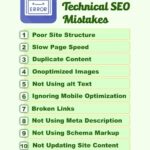Step into the dynamic world of digital marketing where Search Engine Optimization (SEO) reigns supreme. Explore the often-overlooked yet important role of technical SEO in boosting website visibility and ranking.
What is Technical SEO?
Technical SEO refers to the process of optimizing a website’s technical aspects to improve its search engine ranking and drive more qualified traffic.
It involves a range of activities, from website architecture and content delivery to mobile responsiveness and page speed optimization.
Technical SEO is concerned with the behind-the-scenes elements that can either hinder or enhance a website’s ability to be crawled, indexed, and ranked by search engines.
Why is Technical SEO Important?
Technical SEO is essential for several reasons:
Improved Search Engine Crawlability
A website that is technically sound is more likely to be crawled and indexed by search engines, increasing the chances of being ranked higher in search engine results pages (SERPs).
Enhanced User Experience
Technical SEO ensures that your website loads quickly, is mobile-friendly, and provides a seamless user experience, leading to higher engagement rates and lower bounce rates.
Increased Conversion Rates
By optimizing your website’s technical aspects, you can improve the conversion rates of your website, leading to more sales, leads, and revenue.
Key Technical SEO Elements
1. Site Structure
A well-organized site structure is the foundation of good SEO. A confusing or disorganized site structure can make it difficult for search engines to crawl and index your content effectively. Ensure your website has a clear hierarchy, logical navigation, and easily accessible internal links.
2. Page Speed
Page speed is a critical ranking factor for search engines like Google. Slow-loading pages not only frustrate users but also impact your SEO performance. Optimize images, leverage browser caching, and minimize server response time to improve page speed.
3. Mobile Optimization
With the majority of internet users accessing websites via mobile devices, mobile optimization is non-negotiable. Ensure your website is responsive, mobile-friendly, and provides a seamless user experience across all devices.
4. Image Optimization
Large, unoptimized images can slow down your website and affect user experience. Compress images, use the correct file format, and include descriptive filenames to enhance SEO and load times.
5. Schema Markup
Schema markup helps search engines understand the context of your content, leading to rich snippets in search results. Implementing schema markup can enhance your website’s appearance in search results and increase click-through rates.
6. Canonicalization
Canonicalization is the process of specifying a preferred version of a webpage to avoid duplicate content issues. Use canonical tags to resolve duplicate content issues and improve SEO.
7. SSL Encryption
SSL encryption is essential for securing user data and improving search engine trust. Ensure your website has an SSL certificate installed to improve SEO and user trust.
I have compiled a list of 10 Technical SEO Elements dubbed as the “Top 10 Technical SEO Mistakes.” Click the link to read about each element.
Actionable Tips to Improve Your Technical SEO
- Conduct a Technical SEO Audit: Use tools like Screaming Frog or Ahrefs to identify technical SEO issues on your website and prioritize their resolution.
- Optimize Your Website’s Structure: Ensure your website has a clear hierarchy, logical navigation, and easily accessible internal links.
- Improve Page Speed: Optimize images, leverage browser caching, and minimize server response time to improve page speed.
- Ensure Mobile Optimization: Ensure your website is responsive, mobile-friendly, and provides a seamless user experience across all devices.
- Use Schema Markup: Implement schema markup to enhance your website’s appearance in search results and increase click-through rates.
- Canonicalize Duplicate Content: Use canonical tags to resolve duplicate content issues and improve SEO.
- Install SSL Encryption: Ensure your website has an SSL certificate installed to improve SEO and user trust.
Conclusion
Technical SEO is a critical component of any successful SEO strategy. By optimizing your website’s technical aspects, you can improve its search engine ranking, drive more qualified traffic, and enhance user experience.
Remember, technical SEO is an ongoing process that requires continuous monitoring, analysis, and adaptation to stay competitive in the digital landscape.
Get Started with Technical SEO Today
By implementing these technical SEO best practices, you can improve your website’s search engine ranking, drive more qualified traffic, and enhance user experience. Remember to stay up-to-date with the latest technical SEO trends and best practices to stay ahead in the competitive digital landscape.



